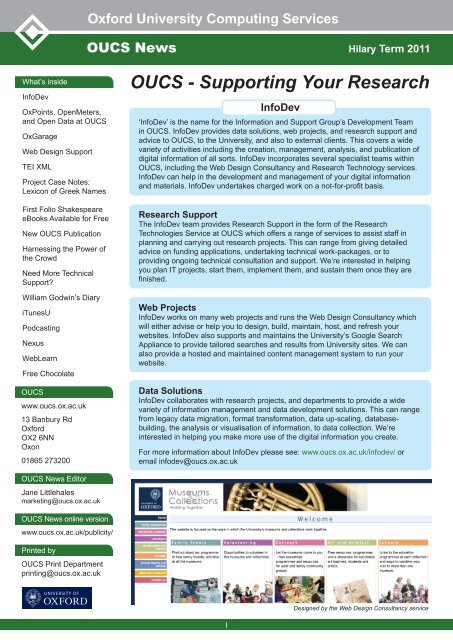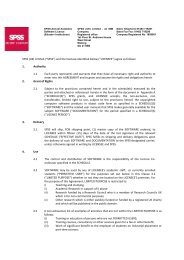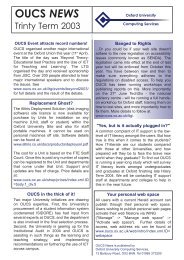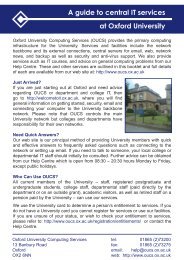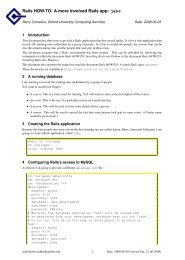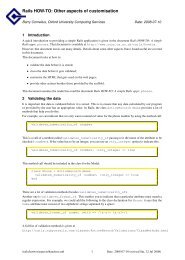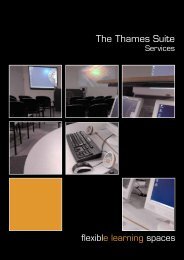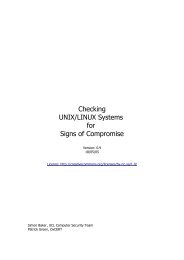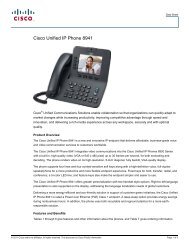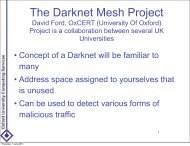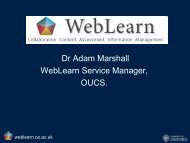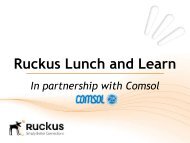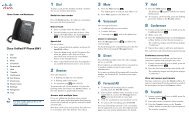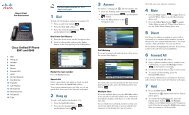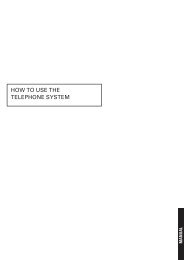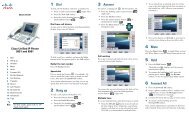Hilary 2011 - IT Services - University of Oxford
Hilary 2011 - IT Services - University of Oxford
Hilary 2011 - IT Services - University of Oxford
Create successful ePaper yourself
Turn your PDF publications into a flip-book with our unique Google optimized e-Paper software.
<strong>Oxford</strong> <strong>University</strong> Computing <strong>Services</strong><br />
OUCS News <strong>Hilary</strong> Term <strong>2011</strong><br />
What’s inside<br />
InfoDev<br />
OxPoints, OpenMeters,<br />
and Open Data at OUCS<br />
OxGarage<br />
Web Design Support<br />
TEI XML<br />
Project Case Notes:<br />
Lexicon <strong>of</strong> Greek Names<br />
First Folio Shakespeare<br />
eBooks Available for Free<br />
New OUCS Publication<br />
Harnessing the Power <strong>of</strong><br />
the Crowd<br />
Need More Technical<br />
Support?<br />
William Godwin’s Diary<br />
iTunesU<br />
Podcasting<br />
Nexus<br />
WebLearn<br />
Free Chocolate<br />
OUCS<br />
www.oucs.ox.ac.uk<br />
13 Banbury Rd<br />
<strong>Oxford</strong><br />
OX2 6NN<br />
Oxon<br />
01865 273200<br />
OUCS - Supporting Your Research<br />
InfoDev<br />
‘InfoDev’ is the name for the Information and Support Group’s Development Team<br />
in OUCS. InfoDev provides data solutions, web projects, and research support and<br />
advice to OUCS, to the <strong>University</strong>, and also to external clients. This covers a wide<br />
variety <strong>of</strong> activities including the creation, management, analysis, and publication <strong>of</strong><br />
digital information <strong>of</strong> all sorts. InfoDev incorporates several specialist teams within<br />
OUCS, including the Web Design Consultancy and Research Technology services.<br />
InfoDev can help in the development and management <strong>of</strong> your digital information<br />
and materials. InfoDev undertakes charged work on a not-for-pr<strong>of</strong>it basis.<br />
Research Support<br />
The InfoDev team provides Research Support in the form <strong>of</strong> the Research<br />
Technologies Service at OUCS which <strong>of</strong>fers a range <strong>of</strong> services to assist staff in<br />
planning and carrying out research projects. This can range from giving detailed<br />
advice on funding applications, undertaking technical work-packages, or to<br />
providing ongoing technical consultation and support. We’re interested in helping<br />
you plan <strong>IT</strong> projects, start them, implement them, and sustain them once they are<br />
finished.<br />
Web Projects<br />
InfoDev works on many web projects and runs the Web Design Consultancy which<br />
will either advise or help you to design, build, maintain, host, and refresh your<br />
websites. InfoDev also supports and maintains the <strong>University</strong>’s Google Search<br />
Appliance to provide tailored searches and results from <strong>University</strong> sites. We can<br />
also provide a hosted and maintained content management system to run your<br />
website.<br />
Data Solutions<br />
InfoDev collaborates with research projects, and departments to provide a wide<br />
variety <strong>of</strong> information management and data development solutions. This can range<br />
from legacy data migration, format transformation, data up-scaling, databasebuilding,<br />
the analysis or visualisation <strong>of</strong> information, to data collection. We’re<br />
interested in helping you make more use <strong>of</strong> the digital information you create.<br />
For more information about InfoDev please see: www.oucs.ox.ac.uk/infodev/ or<br />
email infodev@oucs.ox.ac.uk<br />
OUCS News Editor<br />
Jane Littlehales<br />
marketing@oucs.ox.ac.uk<br />
OUCS News online version<br />
www.oucs.ox.ac.uk/publicity/<br />
Printed by<br />
OUCS Print Department<br />
printing@oucs.ox.ac.uk<br />
Designed by the Web Design Consultancy service<br />
1
OxPoints, OpenMeters, and Open Data at OUCS<br />
OxPoints aims to provide full and accurate geolinking<br />
information for aspects <strong>of</strong> the <strong>University</strong> <strong>of</strong> <strong>Oxford</strong>. The<br />
OxPoints dataset consists <strong>of</strong> names, postal addresses,<br />
web addresses and co-ordinates (latitude and longitude)<br />
for all the departments, colleges and other buildings or<br />
units <strong>of</strong> the <strong>University</strong>, and much more, along with some<br />
<strong>of</strong> the relationships between them.<br />
OUCS has recently released its OxPoints dataset under<br />
the Creative Commons Zero license. This<br />
allows others to use and remix the data for<br />
any purpose with absolutely no restrictions.<br />
We hope that this will encourage greater<br />
reuse and integration both within the<br />
<strong>University</strong> and beyond. InfoDev is also<br />
working with other parts <strong>of</strong> the <strong>University</strong>,<br />
including the Bodleian Libraries to ease the<br />
publication <strong>of</strong> linked open data.<br />
data to aid awareness <strong>of</strong> the <strong>University</strong>’s environmental<br />
sustainability responsibilities. Much <strong>of</strong> this information will<br />
be made available through a single linked data repository.<br />
For more information about OxPoints see http://oxpoints.<br />
oucs.ox.ac.uk/ or if you have a dataset you are interested<br />
in making freely available contact InfoDev at: infodev@<br />
oucs.ox.ac.uk<br />
The OpenMeters project is a collaboration<br />
with the Estates Department to publish<br />
energy consumption information as linked<br />
OxGarage<br />
As part <strong>of</strong> an EU project they were involved with, OUCS’s InfoDev team were partly responsible for the creation <strong>of</strong><br />
a web-based document format conversion service called ‘OxGarage’. This allows you to convert presentations,<br />
spreadsheets, or documents to and from a wide variety <strong>of</strong> formats through an easy-to-use web interface. For example,<br />
OxGarage can provide easy transformations from a Micros<strong>of</strong>t Word Document to TEI XML or a PDF Those with more<br />
technical leanings might be interested in knowing that it also has a RESTful web service API which allows scripting batch<br />
transformations or embedding in other services.<br />
For more information please see: www.oucs.ox.ac.uk/oxgarage/<br />
Web Design Support for Projects<br />
The Web Design Consultancy (WDC, www.oucs.ox.ac.uk/<br />
webdesign/) provides web design and development support for<br />
research projects, either simply building the project website, or<br />
providing design and technical input into the project itself. Some<br />
examples <strong>of</strong> recent projects are detailed below.<br />
Runcoco: how to run a Community Collection online<br />
RunCoCo: how to Run a Community Collection online is a project<br />
set up to <strong>of</strong>fer advice, training, and open-source s<strong>of</strong>tware to those<br />
interested in running a community collection online.<br />
WDC designed the Project logo and built the project website:<br />
http://projects.oucs.ox.ac.uk/runcoco/<br />
2<br />
First World War Poetry Digital Archive
Woruldhord<br />
Woruldhord is part <strong>of</strong> the JISC-funded initiative Runcoco:<br />
How to Run a Community Collection Online and sets out<br />
to collect together into an online hoard, digital objects<br />
related to the teaching, study, or research <strong>of</strong> Old English<br />
and the Anglo-Saxon period <strong>of</strong> history.<br />
WDC designed the project website and provided interface<br />
design for the collection and display interfaces for the<br />
online Community Collection.<br />
http://projects.oucs.ox.ac.uk/woruldhord/<br />
First World War Poetry Digital Archive<br />
The First World War Poetry Digital Archive is an online<br />
repository <strong>of</strong> over 7000 items <strong>of</strong> text, images, audio, and<br />
video for teaching, learning, and research.<br />
WDC provided extensive input into the visual identity and<br />
interface design for the project.<br />
www.oucs.ox.ac.uk/ww1lit/<br />
Monumenta Asiae Minoris Antiqua XI<br />
The aim <strong>of</strong> the MAMA XI project is to make available<br />
some 600 unpublished inscriptions and other ancient<br />
monuments, recorded by Sir William Calder (1881-1960)<br />
and Dr Michael Ballance (†27 July 2006) in the course <strong>of</strong><br />
annual expeditions to Asia Minor in 1954-1957.<br />
WDC are providing interface design on the online edition<br />
<strong>of</strong> the Monumenta Asiae Minoris Antiqua.<br />
http://mama.csad.ox.ac.uk/<br />
For advice and support on web design see<br />
www.oucs.ox.ac.uk/webdesign/ or email: webdesign@<br />
oucs.ox.ac.uk<br />
A Common Technology: TEI XML<br />
Many <strong>of</strong> the projects the OUCS’s InfoDev team has worked on (including the Lexicon <strong>of</strong> Greek Personal Names, Godwin’s<br />
Diary, and ePub editions <strong>of</strong> Shakespeare’s contemporaries described later in OUCS News) manage data as XML valid<br />
against the Text Encoding Initiative (TEI) Guidelines (www.tei-c.org). The Epidoc conventions used in digitizing classical<br />
inscriptions are another example <strong>of</strong> a use <strong>of</strong> the TEI.<br />
The TEI provides a comprehensive standard for tagging<br />
• transcribed texts (drama, poetry, speech, dictionaries etc)<br />
• genetic editing<br />
• links between facsimiles and transcribed text<br />
• manuscript descriptions<br />
• identified names, places, people and dates<br />
• analysis, linguistic tagging, non-hierarchical structures<br />
Here is a well-known piece from Shakespeare marked up in TEI XML:<br />
<br />
<br />
Ariell Song.<br />
<br />
Full fadom fiue thy Father lies,Of his bones are Corrall made:Those are pearles that<br />
were his eies,Nothing <strong>of</strong> him that doth fade,But<br />
doth suffer a Sea-changeInto something<br />
rich, & strange:Sea-Nimphs hourly ring<br />
his knell.<br />
<br />
Burthen: ding dong.<br />
Harke now I heare them, ding-dong bell.<br />
<br />
<br />
The TEI Guidelines were first published 20 years ago, but the current version is the result <strong>of</strong> a large-scale revision<br />
undertaken between 2001 and 2009 by text-encoding experts worldwide. <strong>Oxford</strong> is one <strong>of</strong> four universities which act as<br />
special ‘hosts’ within the membership consortium which manages the TEI, and OUCS staff have played a considerable<br />
part in TEI development. Sebastian Rahtz and James Cummings are well-known n the TEI world, and are elected<br />
members <strong>of</strong> the organisation’s Technical Council. OUCS also undertakes much <strong>of</strong> the editorial work.<br />
3
Project Case Notes: The Lexicon <strong>of</strong> Greek Personal Names<br />
The Lexicon <strong>of</strong> Greek Personal Names (LGPN) was established in 1972 as a Major Research Project <strong>of</strong> the British<br />
Academy. The overall objective <strong>of</strong> the LGPN project is to create a comprehensive and authoritative record <strong>of</strong> the names<br />
<strong>of</strong> all individuals attested in Greek (or with Greek names attested in Latin) in the ancient Greek-speaking world, and so<br />
provide the classical research community world-wide with a unique and fundamental resource for the study <strong>of</strong> all aspects<br />
<strong>of</strong> the ancient Greek world.<br />
LGPN is internationally recognised<br />
as a resource which has transformed<br />
the basis on which names may be<br />
studied and used. It has done so to<br />
date primarily through its publications;<br />
so far, over a quarter <strong>of</strong> a million<br />
individuals sharing over 35,000 names<br />
have been published in six regional<br />
volumes.<br />
OUCS has been assisting<br />
the LGPN with its database,<br />
typesetting and (most recently) web<br />
presence since the early 1980s, and<br />
the project has successfully weathered<br />
30 years <strong>of</strong> changes in humanities<br />
computing.<br />
In its most recent incarnation, an<br />
InfoDev project has put together a new<br />
web-based search <strong>of</strong> all the data, and<br />
enabled the Lexicon to make its data<br />
available in formats such as TEI XML,<br />
JSON, KML and RDF using the CIDOC<br />
CRM ontology (see below). The project<br />
now participates in up-to-the minute<br />
collaborations using linked data and<br />
open standards.<br />
Whatever is ....CIDOC CRM?<br />
CIDOC Conceptual Reference Model (CRM) is an ontology<br />
used by quite a few humanities research projects.<br />
The CRM provides a set <strong>of</strong> definitions and a formal<br />
structure for describing the implicit and explicit concepts<br />
and relationships used in cultural heritage documentation.<br />
Key elements:<br />
• Actors (people)<br />
• Conceptual objects<br />
• Physical things<br />
• Events<br />
• Time spans<br />
• Places<br />
and relationships between them. e.g.<br />
• participate in<br />
• refer to<br />
• have location<br />
• within<br />
CIDOC CRM is <strong>of</strong>ten expressed in the form <strong>of</strong> RDF<br />
(Resource Description Framework) assertions, as this<br />
example shows:<br />
<br />
<br />
<br />
Παράμονος<br />
<br />
<br />
<br />
<br />
<br />
<br />
<br />
<br />
-0225 to -0175<br />
<br />
<br />
<br />
<br />
<br />
<br />
<br />
<br />
4
First Folio Shakespeare eBooks Available for Free, via <strong>Oxford</strong> on iTunes U<br />
Shakespeare’s entire First Folio, including original<br />
spelling, is being made available to download for free,<br />
as <strong>Oxford</strong> <strong>University</strong> becomes one <strong>of</strong> the world’s first<br />
universities to add ePubs to iTunes U, a dedicated area<br />
within the iTunes Store (www.itunes.com).<br />
Like the <strong>University</strong>’s hundreds <strong>of</strong> free audio and video<br />
podcasts available on iTunes U (http://itunes.ox.ac.uk),<br />
the ePubs are available for anyone to download and<br />
enjoy. This development comes shortly after <strong>Oxford</strong><br />
on iTunes U celebrated its second anniversary by<br />
surpassing five million downloads <strong>of</strong> its audio and video<br />
material.<br />
The <strong>University</strong> is also making six plays by<br />
contemporaries <strong>of</strong> Shakespeare available, including The<br />
Duchess <strong>of</strong> Malfi by John Webster.<br />
Dr Emma Smith,<br />
Lecturer in English<br />
Literature at <strong>Oxford</strong>,<br />
whose lectures on<br />
iTunes U have been<br />
particularly popular,<br />
said: ‘It’s great to have<br />
released free ePubs<br />
<strong>of</strong> both First Folio<br />
Shakespeare plays and<br />
lesser known works. I<br />
hope that this material<br />
will be enjoyed as<br />
widely as possible.’<br />
Today’s ePubs include Shakespeare’s first folio <strong>of</strong> 36<br />
plays, ePubs to accompany <strong>Oxford</strong>’s ‘Approaching<br />
Shakespeare’ lectures and ePubs to accompany our<br />
‘Not Shakespeare: Elizabethan and Jacobean Popular<br />
theatre’ lectures.<br />
<strong>Oxford</strong> is in a unique position to make historic and rare<br />
texts available in ePub form because <strong>of</strong> its expertise in<br />
text archiving and encoding. The <strong>University</strong><br />
Computing <strong>Services</strong> has run the <strong>Oxford</strong> Text<br />
Archive (www.ota.ox.ac.uk) since 1976, and the<br />
<strong>University</strong> is one <strong>of</strong> five worldwide hosts <strong>of</strong> the<br />
Text Encoding Initiative Consortium<br />
(www.tei-c.org).<br />
The <strong>University</strong> will be adding more ePubs to<br />
iTunes U in the future.<br />
All the material has been released under<br />
a Creative Commons licence for reuse in<br />
education worldwide.<br />
• Shakespeare’s first folio: http://tinyurl.com/<br />
Shakespearesfirstfolio<br />
• Approaching Shakespeare’ lectures;<br />
http://tinyurl.com/approachingshakespeare<br />
• Not Shakespeare: Elizabethan and<br />
Jacobean Popular theatre: http://tinyurl.com/<br />
notshakespeare<br />
5
New OUCS Publication: Impact and Engagement<br />
Recognising the growing need for advice in this important area, OUCS has produced a new guide<br />
to using <strong>IT</strong> in activities such as impact, and business/community engagement. This is based on<br />
work undertaken by several OUCS projects and aims to provide researchers, departments, and<br />
colleges with a set <strong>of</strong> tips that can be easily implemented. The guide begins by discussing how<br />
useful <strong>IT</strong> can be in terms <strong>of</strong> outreach activities, and also in assisting with ‘impact’ - which is now<br />
becoming more and more important for research projects. It looks at the strategic background to<br />
this, and then provides a list <strong>of</strong> suggestions covering a stakeholder analysis, effective web sites,<br />
dissemination and community building, extending events, and extending the reach <strong>of</strong> a project.<br />
Finally, it concludes with an overview <strong>of</strong> OUCS’s activities in terms <strong>of</strong> engagement, looking at:<br />
economic impact and knowledge transfer, bringing learning resources to a wider audience,<br />
widening participation, the environment, and arts and culture.<br />
The full guide is available at: www.oucs.ox.ac.uk/publicity/leaflets-guides/impactguide.xml. Printed<br />
copies have been circulated to Heads <strong>of</strong> Department also.<br />
Many Hands Make Light work: Harnessing the Power <strong>of</strong> the Crowd<br />
Would you consider telling the Government which laws<br />
and regulations to get rid <strong>of</strong>, or helping the Guardian<br />
examine MPs expenses? Would you like to be able to<br />
classify galaxies, read ships logs from the First World<br />
War, or add references to a map for others to find? All<br />
that is now possible through a rapidly growing set <strong>of</strong><br />
online crowdsourcing and community collection projects.<br />
What is community collection and<br />
crowdsourcing?<br />
A ‘community collection’ is where the general public or<br />
members <strong>of</strong> a particular group are invited to contribute<br />
to a project by uploading their own content (for example<br />
pictures from the First World War, accounts <strong>of</strong> a day in<br />
their lives, or suggestions <strong>of</strong> what laws to abolish) or by<br />
adding information to existing resources (for example<br />
classify types <strong>of</strong> galaxies, mark locations on a map, or<br />
identify dodgy expenses claims).<br />
Crowdsourcing initiatives, where a task is outsourced to<br />
the public, a community or a large group <strong>of</strong> volunteers,<br />
are becoming increasingly popular and are now used in<br />
many different areas, including academic research. An<br />
early example <strong>of</strong> a crowdsourcing project is Galaxy Zoo,<br />
which invited volunteers to look at images <strong>of</strong> galaxies and<br />
classify them according to shape - a relatively simple task<br />
for humans but difficult to do automatically. With the help<br />
<strong>of</strong> the crowd, astronomers got new and reliable data to<br />
use in their work. Several projects have followed Galaxy<br />
Zoo and can be found in the Zooniverse - a common<br />
platform for ‘citizen science’ projects in a variety <strong>of</strong><br />
disciplines. See www.zooniverse.org.<br />
RunCoCoCo – how to run a community<br />
collection online<br />
RunCoCo is a project based at OUCS set up to <strong>of</strong>fer<br />
advice, training, and open-source s<strong>of</strong>tware to those<br />
interested in running a community collection online.<br />
The one-year project is funded by JISC and builds on<br />
the success <strong>of</strong> the Great War Archive – a community<br />
collection that collected First World War memorabilia<br />
(see www.oucs.ox.ac.uk/ww1lit/gwa). Part <strong>of</strong> the<br />
RunCoCo remit is to make available and share the<br />
experiences <strong>of</strong> the Great War Archive project, to collate<br />
and make available useful information and tools that can<br />
help others run a community collection in their area. In<br />
addition to publishing guidelines and advice documents,<br />
the project is <strong>of</strong>fering support to those running or<br />
planning community collection. The project has held four<br />
training events, and material from these is being made<br />
available on the project website. Another resource that<br />
the project is making available is the CoCoCo s<strong>of</strong>tware,<br />
which can used for running a community collection<br />
online.<br />
To try out the resources and tools that are being<br />
created, RunCoCo has run an exemplar collection. Over<br />
the summer, Project Woruldhord (http://projects.oucs.<br />
ox.ac.uk/woruldhord/) collected digital objects related to<br />
the teaching, study, or research <strong>of</strong> Old English and the<br />
Anglo-Saxon period <strong>of</strong> history. The project received a lot<br />
<strong>of</strong> attention both in academic circles and the media and<br />
a large number <strong>of</strong> excellent resources were submitted<br />
by people from all over the world. These resources will<br />
soon be made available online.<br />
The RunCoCo project is only funded to run for one year<br />
but the resources that are created will remain available<br />
on the project website after the project ends.<br />
More information<br />
More information about RunCoCo and community<br />
collection projects can be found via the RunCoCo<br />
website (http://projects.oucs.ox.ac.uk/runcoco/) and blog<br />
(http://blogs.oucs.ox.ac.uk/runcoco/).<br />
6
Need More Technical Support?<br />
NSMS support researchers <strong>IT</strong> requirements through a<br />
range <strong>of</strong> services aimed at providing resources for well<br />
defined costs and for short medium or long periods.<br />
VM4Rent: Rent a Virtual Server for anything from 1<br />
month to many years. Allows full access to install,<br />
configure and maintain your system.<br />
Premium Web Hosting: NSMS can support your project<br />
website on a range <strong>of</strong> technologies and with support from<br />
a team <strong>of</strong> experts. Design assistance can be provided by<br />
the OUCS Web Consultancy service.<br />
<strong>IT</strong> consultancy: NSMS can provide consultancy on any<br />
area <strong>of</strong> <strong>IT</strong> provision for a research project. With skills<br />
in a wide range <strong>of</strong> topic such as virtualisation, storage<br />
provision, clustering, web service provision and many<br />
more, NSMS is in an ideal position to assist.<br />
For further details on any <strong>of</strong> these services please see<br />
out website www.oucs.ox.ac.uk/nsms or why not call for<br />
discussion about your project on 01865 273209.<br />
Did You Know About ... ePub?<br />
The success this year <strong>of</strong> the Apple iPad has brought<br />
the ePub standard to new prominence, as the format for<br />
electronic books, used by the excellent iBooks program.<br />
ePub is an open standard for ebooks owned by the<br />
International Digital Publishing Forum (IDPF). The format<br />
is really rather simple: it is a zip archive <strong>of</strong> HTML files,<br />
just the same ones you used for the web, with associated<br />
CSS files, images etc, and a set <strong>of</strong> metadata files written<br />
in XML which provide information like a table <strong>of</strong> contents,<br />
and reading order.<br />
William Godwin’s Diary: An InfoDev Case Study<br />
About the project<br />
The William Godwin’s Diary project has transcribed,<br />
edited, and annotated 48 years <strong>of</strong> William Godwin’s diary<br />
from 1788-1836. The diary is a resource <strong>of</strong> immense<br />
importance to researchers <strong>of</strong> history, politics, literature,<br />
and women’s studies. It maps the radical intellectual and<br />
political life <strong>of</strong> the late eighteenth and early nineteenth<br />
centuries, as well as providing extensive evidence on<br />
publishing relations, conversational coteries, artistic<br />
circles and theatrical production over the same period.<br />
One can also trace the developing relationships <strong>of</strong> one <strong>of</strong><br />
the most important families in British literature, Godwin’s<br />
own, which included his wife Mary Wollstonecraft (1759-<br />
1797), their daughter Mary Shelley (1797-1851) and his<br />
son-in-law Percy Bysshe Shelley (1792-1822). Many <strong>of</strong><br />
the most important figures in this period <strong>of</strong> British cultural<br />
history feature in its pages, including Anna<br />
Barbauld, Samuel Taylor Coleridge, Charles<br />
James Fox, William Hazlitt, Thomas Holcr<strong>of</strong>t,<br />
Elizabeth Inchbald, Charles and Mary Lamb,<br />
Mary Robinson, Richard Brinsley Sheridan,<br />
William Wordsworth, and many others. The<br />
resource, which includes complete images<br />
and detailed full-text transcriptions, is freely<br />
available at http://godwindiary.bodleian.ox.ac.uk/<br />
Training project staff<br />
One <strong>of</strong> the appropriate technologies for marking up such<br />
texts are the Guidelines <strong>of</strong> the Text Encoding Initiative<br />
(www.tei-c.org). TEI P5 XML is a de facto standard<br />
for the encoding <strong>of</strong> digital text which over the last<br />
couple decades the <strong>University</strong> <strong>of</strong> <strong>Oxford</strong> has become<br />
international leaders in the support and development in<br />
their role as a TEI Consortium host. Two members <strong>of</strong><br />
InfoDev are fortunate enough to be elected members<br />
<strong>of</strong> the TEI Technical Council and so help to shape<br />
the ongoing developments <strong>of</strong> this important set <strong>of</strong><br />
recommendations.<br />
Planning the project<br />
OUCS’s InfoDev team (www.oucs.ox.ac.<br />
uk/infodev) provided research advice and<br />
support. It was involved in planning the funding<br />
bid for the project and helped specify the<br />
technical components <strong>of</strong> the bid and assisted<br />
in specifying technical solutions that were<br />
both appropriate and feasible. This was<br />
a collaborative inter-departmental project<br />
between Politics, OUCS and the Bodleian. The<br />
bid was successful in receiving funding from<br />
the Leverhulme Trust.<br />
7
HFS Backup and Archive <strong>Services</strong><br />
OUCS provides a <strong>University</strong>-wide backup and long-term<br />
file storage service for staff and postgraduate students.<br />
The Hierarchical File Server (HFS, www.oucs.ox.ac.uk/<br />
hfs/) provides an automated backup service for personal<br />
computers and servers alike. Should a file be deleted<br />
from your computer, the last backed-up version is<br />
retained on the HFS for 90 days. If you are working away<br />
from <strong>Oxford</strong>, for example at home or on a field trip, it is<br />
still possible to backup and restore essential data so long<br />
as you have a reasonable Internet connection, a remote<br />
access account and a working VPN client. Data can<br />
be restored to a different computer (so long as the file<br />
system is the same) and access to data remains private<br />
to the owner.<br />
For the long-term, secure storage <strong>of</strong> valuable research<br />
data the HFS provides an archive service. Research<br />
projects, large and small, may archive up to 1 TB <strong>of</strong><br />
data (additional data is charged on a five yearly basis).<br />
The scope <strong>of</strong> the service and terms <strong>of</strong> use are outlined<br />
in the HFS archive policy, www.oucs.ox.ac.uk/hfs/policy/<br />
archive.xml. The HFS only provides a long-term file<br />
storage facility. Data owners are still expected to curate<br />
and manage the data lodged with the HFS.<br />
Nexus SharePoint for Research<br />
The Nexus Service will be releasing a SharePoint<br />
service in <strong>Hilary</strong> Term <strong>2011</strong>, designed to enable online<br />
collaboration and document sharing. Since June 2010 a<br />
number <strong>of</strong> departments and colleges have been trialling<br />
the service as early adopters. In particular, OUCS has<br />
supported the use <strong>of</strong> SharePoint for the administration <strong>of</strong><br />
committees and for supporting collaborative research.<br />
Any site designed to support research might include:<br />
document and image libraries; fine-grained access<br />
controls; site calendar, task, and customised lists; wiki<br />
and team discussion forums; and sub-sites (e.g. to<br />
manage a project steering committee). Individual users <strong>of</strong><br />
SharePoint may also have a ‘My Site’ which, for example,<br />
can be used to maintain a research pr<strong>of</strong>ile as well as<br />
sharing <strong>of</strong> documents with colleagues. The service<br />
available in <strong>Hilary</strong> Term will be based on SharePoint 2010<br />
which also <strong>of</strong>fers online versions <strong>of</strong> Office applications<br />
(on all major platforms) and social networking tools.<br />
Research Data Management Projects at<br />
OUCS<br />
OUCS has taken a leading role in gathering requirements<br />
and piloting both infrastructure and support services for<br />
the management <strong>of</strong> research data. Much <strong>of</strong> this activity<br />
has been funded by JISC, with an initial project funded<br />
by the John Fell Fund. The Embedding Institutional<br />
Data Curation <strong>Services</strong> in research (Eidcsr, http://eidcsr.<br />
oucs.ox.ac.uk/) project has worked with three research<br />
groups in computing and medical sciences, investigating<br />
tools and processes to manage large quantities <strong>of</strong> data<br />
(especially in conjunction with the HFS).<br />
The Supporting Data Management Infrastructure for the<br />
Humanities (Sudamih, http://sudamih.oucs.ox.ac.uk/)<br />
project has focussed on developing training materials<br />
and an online database management application<br />
(Database-as-a-Service, DaaS) to meet the requirements<br />
<strong>of</strong> academics in the humanities. OUCS research data<br />
management projects have been in collaboration with<br />
academics, Research <strong>Services</strong>, and the Bodleian<br />
Libraries.<br />
Google Search Appliance<br />
OUCS runs a Google Search Appliance to give improved<br />
site-searching for web servers inside the <strong>Oxford</strong> domain.<br />
Currently this indexes well over 734,000 documents<br />
and allows familiar Google searching <strong>of</strong> <strong>University</strong> sites.<br />
InfoDev provides support for maintaining this service and<br />
integrating it with local sites.<br />
To find out more look at: www.oucs.ox.ac.uk/googlesearch/<br />
Conducting<br />
a survey?<br />
Then use WebLearn<br />
Research Data Management Website<br />
In collaboration with OUCS (through the Eidcsr project),<br />
Research <strong>Services</strong> have developed a website intended<br />
to provide a gateway to services within and beyond the<br />
<strong>University</strong> to support researchers in the management <strong>of</strong><br />
their research data. The website includes a useful Data<br />
Management Planning Checklist and discrete sections<br />
on data backup, security, and sharing, as well as a list <strong>of</strong><br />
training and support facilities available. The website will<br />
assist in the formulation <strong>of</strong> data management plans for<br />
grant proposals. www.admin.ox.ac.uk/rdm/.<br />
weblearn.ox.ac.uk<br />
Course experience<br />
Data gathering<br />
Public survey<br />
<strong>Oxford</strong> <strong>University</strong><br />
Computing <strong>Services</strong><br />
http://www.flickr.com/photos/ekilby/2868641206<br />
8
iTunesU<br />
<strong>Oxford</strong>’s iTunes U site is now 2 years old. It has had just<br />
over 5 million downloads, contains more hours <strong>of</strong> material<br />
than any other UK university and regularly has several<br />
podcasts in the global top ten.<br />
The ‘Building a Business’ series is still popular and<br />
Marianne Talbot is following up her phenomenally<br />
successful ‘Romp through the history <strong>of</strong> philosophy’<br />
(more than half a million downloads) with ‘The Nature <strong>of</strong><br />
Arguments’, part <strong>of</strong> her ‘Critical Reasoning for Beginners’<br />
series.<br />
Content is being added regularly to the site. All content is<br />
free for you to download and watch or listen to.<br />
Recent highlights include:<br />
• History <strong>of</strong> Tropical Medicine at <strong>Oxford</strong><br />
• La Bella Principessa: A Leonardo Discovered<br />
• General Philosophy<br />
• <strong>Oxford</strong> Climate Forum<br />
• Stephen Garrett, News International Visiting<br />
Pr<strong>of</strong>essorship <strong>of</strong> Broadcast Media<br />
• Translational Medicine<br />
• Anthropology<br />
• Alumni Weekend 2010<br />
<strong>Oxford</strong>’s site: http://itunes.ox.ac.uk<br />
Watched by Millions<br />
<strong>Oxford</strong>’s iTunes U site features in the latest Apple iPad TV advert. It aired for the first time in the US on 1 st November<br />
across all major networks in prime time, including during a World Series game (which Apple tell us is quite popular). This<br />
advert also was shown throught Nov/Dec on UK prime time TV.<br />
The advert features one <strong>of</strong> Pr<strong>of</strong>essor James Binney’s Quantum Mechanics lectures. He has since jumped up to number<br />
6 in the Top Downloads chart (making 4 <strong>Oxford</strong> podcasts in the Top 15)<br />
You can see the<br />
advert here on the<br />
Apple website:<br />
www.apple.com/<br />
ipad/gallery/ads.<br />
html#ad-electric<br />
Many thanks to<br />
Stuart Lee for<br />
heroically sorting<br />
out the legal<br />
paperwork, to<br />
PAD’s Carolyne<br />
Culver, to Pete<br />
Robinson and<br />
Steve Pierce,<br />
and to Pr<strong>of</strong>essor<br />
Binney,<br />
9
Potential Podcasters Gather in Isis<br />
On a bitterly cold Friday afternoon in<br />
early December, twenty Alumni and<br />
Development <strong>of</strong>ficers from colleges<br />
and departments across the <strong>University</strong><br />
gathered at OUCS to hear about how<br />
podcasting could help them provide value<br />
to their alumni and encourage generous<br />
donations.<br />
Paul Jeffreys (Director <strong>of</strong> <strong>IT</strong>) introduced<br />
the event and Peter Robinson from the<br />
Learning Technologies Group gave a<br />
presentation that showcased iTunesU<br />
and the fantastic podcasting resource<br />
that has been built up over the last<br />
couple <strong>of</strong> years.<br />
Delegates were treated to snippets from<br />
a number <strong>of</strong> favourite podcasts and a<br />
showing <strong>of</strong> the Apple advert featuring<br />
Pr<strong>of</strong>essor Binney giving a lecture on<br />
quantum mechanics that has been<br />
broadcast on UK and US television.<br />
Peter suggested a range <strong>of</strong> approaches<br />
to using podcasting that the delegates<br />
might like to try and – with warm geniality<br />
– encouraged them to ‘have a go’<br />
themselves. He explained that there is a<br />
great deal <strong>of</strong> support available, including<br />
expert help, the loan <strong>of</strong> equipment,<br />
enthusiastic student podcasting teams<br />
and specific training for beginners at<br />
OUCS.<br />
The question and answer session<br />
soon dispelled doubts about costs<br />
and fears about technology. Ideas<br />
were buzzing. Over tea and cakes<br />
afterwards, delegates spoke <strong>of</strong> how<br />
their imaginations had been sparked by<br />
what they had seen, and many were already planning<br />
podcasts and brainstorming how they could use the<br />
resource to reach their alumni and highlight events<br />
at their colleges and departments. Ideas included<br />
showcasing material using blogs and compiling clickthrough<br />
playlists on websites.<br />
The message seemed clear – podcasting is accessible<br />
and catching on in a big way!<br />
By the beginning <strong>of</strong> December 2010, the <strong>Oxford</strong> on<br />
iTunesU channel achieved:<br />
• 7 million downloads<br />
• 240 different lecture sets containing around 1,900<br />
items<br />
• more than 50,000 podcasts are downloaded each<br />
week<br />
• several <strong>Oxford</strong> talks regularly appear in the global top<br />
20 iTunesU downloads with more than 5,000<br />
downloads per week.<br />
<strong>Oxford</strong> iTunes U: http://itunes.ox.ac.uk<br />
Help, training and guides for Podcasting at <strong>Oxford</strong>:<br />
www.oucs.ox.ac.uk/podcasts<br />
Talks from the Alumni Weekend 2008-2010:<br />
http://tinyurl.com/oxford-alumni<br />
Podcasting Help<br />
New Improved guidance pages for <strong>Oxford</strong> Podcasters<br />
(including help videos): www.oucs.ox.ac.uk/podcasts/<br />
how-to-podcast.xml<br />
We’re on Twitter !<br />
Get short, timely messages from <strong>Oxford</strong> Podcasts.<br />
Twitter is a rich source <strong>of</strong> instantly updated information.<br />
It’s easy to stay updated on an incredibly wide variety <strong>of</strong><br />
topics. Why not follow @oxfordpodcasts.<br />
http://twitter.com/oxfordpodcasts<br />
10
Nexus<br />
The Next Nexus<br />
The <strong>Oxford</strong> Nexus Exchange service, with its 46,000<br />
accounts, has a sister service, based on SharePoint.<br />
SharePoint should be available to all members <strong>of</strong> the<br />
<strong>University</strong> by Trinity Term <strong>of</strong> this year and should have<br />
already moved through some major improvements and<br />
upgrades by that time.<br />
Collaborating on documents with Nexus<br />
<strong>Oxford</strong> Nexus is largely known for its Micros<strong>of</strong>t Exchange<br />
mailboxes, including calendars, tasks, contacts, and<br />
much shared and devolved functionality. However, for<br />
much <strong>of</strong> 2010, we have been piloting a service to early<br />
adopters that arose from the need for collaborative work<br />
on documents. That collaborative work could encompass<br />
the drafting <strong>of</strong> research papers, committee activities and<br />
that for clubs and societies. The new service is about to<br />
be opened up, beyond its early adopters, to the whole <strong>of</strong><br />
the <strong>University</strong>, and may include external collaborators.<br />
The platform for early adopters was based on SharePoint<br />
2007, but we have opted for an early upgrade to<br />
SharePoint 2010. Current users will be migrated to the<br />
2010 service by the end <strong>of</strong> January. If all goes well, we<br />
anticipate that the SharePoint service will be available<br />
to any member <strong>of</strong> the <strong>University</strong> by Trinity Term <strong>2011</strong>.<br />
SharePoint poses a real challenge to OUCS as it is not<br />
only a completely novel service, but it is a service that<br />
can be used so differently by different people that the<br />
model for supporting the application may call for far more<br />
<strong>of</strong> a ‘community-based’ approach.<br />
Successful major migrations<br />
Meanwhile the Nexus Team has been establishing the<br />
Micros<strong>of</strong>t Exchange service as the central ‘nexus’ <strong>of</strong><br />
the <strong>University</strong> in terms <strong>of</strong> communication and working<br />
together. Two large migrations, one complete, one<br />
nearing completion, have been carried out recently.<br />
Former Lotus Notes users in <strong>University</strong> Administration<br />
<strong>Services</strong> and the ex-Groupwise users in Medical<br />
Sciences now find themselves with Nexus accounts and<br />
with the ability to schedule a meeting with nearly anyone<br />
across the <strong>University</strong> at the click <strong>of</strong> a mouse.<br />
<strong>Oxford</strong> Nexus seems never to stand still.<br />
Updates, additional functionality and resilience<br />
We are also working hard on moving our Micros<strong>of</strong>t<br />
Exchange infrastructure from Exchange 2007 to<br />
Exchange 2010. You should notice a far more equitable<br />
experience across the major web browsers, especially<br />
Internet Explorer, Firefox, and Safari. Unfortunately for<br />
us, upgrading to Exchange 2010 brings with it a major<br />
move in terms <strong>of</strong> data storage. You may know that we<br />
have a two-site system whereby – in theory – a complete<br />
outage <strong>of</strong> OUCS should result in the service running from<br />
the second site at Begbroke (and vice versa <strong>of</strong> course).<br />
We are using two powerful Storage Area Networks to<br />
manage this. However, with Exchange 2010, we may<br />
need to move the 25 Terabytes or so <strong>of</strong> data to a different<br />
kind <strong>of</strong> storage, (wholly or partly, rapidly or gradually)<br />
and/or reconfigure our current storage. This could be<br />
somewhat <strong>of</strong> a headache as we shall aim – as always –<br />
for little or no interruption to your service.<br />
Positive growth<br />
Email seems to be ever more popular, leading to eyewatering<br />
growth in disk consumption. At the moment we<br />
are seeing our disk usage increase at a rate <strong>of</strong> 900 GB<br />
per month. We have also seen a 62% increase in size <strong>of</strong><br />
the average mailbox since March 2010. Just over a half<br />
percent <strong>of</strong> <strong>Oxford</strong> Nexus users pay a premium charge for<br />
a larger mailbox yet, as in all things consumer, it would<br />
seem 70% <strong>of</strong> the data is owned by 20% <strong>of</strong> the users.<br />
The Nexus Team, as well as many in OUCS – particularly<br />
the Help Centre – is working tirelessly in order to cope<br />
with the enormous growth in demand. We also hope that<br />
our new service is found to be another invaluable tool in<br />
the electronic work environment at <strong>Oxford</strong>.<br />
Grand Giveaway <strong>of</strong> USB Pens<br />
and Laptop Locks<br />
OUCS produce a number <strong>of</strong> publications,<br />
including OUCS News, the Impact Guide,<br />
Annual reports, etc. and we need photos to<br />
enhance these. Following an <strong>of</strong>fice clearout,<br />
we also have lots <strong>of</strong> 1GB USB pens and<br />
laptop locks to give away.<br />
Simply submit your photo <strong>of</strong> an <strong>IT</strong> device<br />
(laptop, router, phone, etc.) in an <strong>Oxford</strong><br />
setting and the best each month will win a<br />
prize.<br />
Photos can include people, or not. If the<br />
screen is visible, it should be showing an<br />
OUCS web or Mobile <strong>Oxford</strong> page. Nothing<br />
rude please. Apart from that, its up to you.<br />
Address for submissions is marketing@<br />
oucs.ox.ac.uk or to the <strong>Oxford</strong> <strong>University</strong><br />
Computing <strong>Services</strong> Facebook page. The<br />
competition will run until July <strong>2011</strong> to give<br />
you a chance to take some sunshine shots!<br />
By submitting a photo, you give OUCS<br />
permission to use it in OUCS publications.<br />
We’ll give you credit, <strong>of</strong> course.<br />
11
New Module Enrolment Tool<br />
WebLearn Survey Tool Available<br />
The WebLearn Survey tool (released as a Beta<br />
version) can be used to design and manage electronic<br />
questionnaires to be delivered on-line. Surveys can be<br />
created to gather data for research purposes, general<br />
data gathering, or for course, lecturer or tutor evaluation,<br />
feedback and review.<br />
Questionnaire templates can be created from scratch, or<br />
existing templates can be copied and modified. Various<br />
question types are available, such as Lickert scales,<br />
multiple choice with a single answer, multiple choice<br />
with multiple answers, and free text questions. Detailed<br />
settings control open and close dates, how participants<br />
access the survey, and who may view the results.<br />
Michaelmas term 2010 saw the introduction <strong>of</strong> a brand<br />
new, locally written module registration tool known as<br />
SES (Student Enrolment System). The tool works in<br />
conjunction with a course or module database known<br />
as DAISY which is being developed by the Social<br />
Sciences Division with help from MPLS. DAISY currently<br />
contains over 300 Graduate training courses hosted by<br />
MPLS departments (as part <strong>of</strong> their Graduate Academic<br />
Programme or GAP); Social Sciences will be adding<br />
a selection <strong>of</strong> their Graduate training courses before<br />
Christmas (2010).<br />
All available courses can be browsed via the SES tool<br />
within WebLearn and students are allowed to request a<br />
place on one or more courses. The request is passed<br />
along to the course administrator who can either<br />
reject the application or accept it in which case the<br />
student’s supervisor is contacted and asked to give their<br />
blessing. If a student is accepted then they will receive<br />
a confirmation email. DAISY will take care <strong>of</strong> interdepartmental<br />
billing but this facility is not operational this<br />
academic year.<br />
The ‘student’ interface presents a hierarchy <strong>of</strong> divisions<br />
and departments and the courses that are <strong>of</strong>fered<br />
(see screen-shot opposite). This can be browsed or<br />
all courses can be searched; both course title and<br />
description are searched. Students can also see a list <strong>of</strong><br />
current, upcoming and past courses but as WebLearn<br />
does not collect attendance data, this list has no <strong>of</strong>ficial<br />
status.<br />
Call for Participation – WebLearn Polls via m.ox (Mobile <strong>Oxford</strong>)<br />
Have you ever wished your students could respond in class using personal voting<br />
systems (‘clickers’), but never quite got around to trying it? Well now you don’t<br />
need any special technology – the students can answer questions on their internetenabled<br />
phones, and learn from each other while sharing phones, if necessary.<br />
OUCS has launched Mobile <strong>Oxford</strong> (m.ox.ac.uk) (beta) which allows anyone with<br />
an internet-enabled mobile phone to access <strong>Oxford</strong> podcasts, certain WebLearn<br />
tools, or information on library holdings, bus times and the weather (amongst other<br />
things).<br />
We are running a pilot project using the WebLearn Polls tool via the mobile<br />
platform, to enhance and support student learning.<br />
Are you interested (or could you recommend any lecturers in your dept/division) in<br />
participating in our pilot project using the WebLearn Polls tool via student mobile<br />
phones during a lecture or small class? Please follow this link if you would like to<br />
participate in the pilot project: http://tinyurl.com/35hgf85<br />
This will enable you to join the Mobile Polls Pilot site in WebLearn and keep up to<br />
date with developments.<br />
A prize will be <strong>of</strong>fered for the person who gets the most people to respond via a<br />
mobile phone to a single poll in <strong>Hilary</strong> term. We will collaborate with all participants<br />
in the pilot project to write up your case study for the OUCS collection <strong>of</strong> teaching<br />
and learning case studies, as well as for possible inclusion in the next JISC book <strong>of</strong><br />
case studies documenting innovative practice.<br />
12
New Module Enrolment Tool continued<br />
There are interfaces for course administrators and supervisors, these show a list <strong>of</strong> course requests and the current<br />
status <strong>of</strong> the application. It is also possible to bulk register students - this facility is typically used by the host department<br />
to pre-register their own students before throwing the course open to others.<br />
Social Sciences will require their<br />
students to register for specific courses<br />
in <strong>Hilary</strong> term <strong>2011</strong>. The other divisions<br />
are well aware <strong>of</strong> the system and are<br />
carefully considering whether to use it in<br />
the future.<br />
There is a small amount <strong>of</strong> overlap<br />
with HR Information System (HRIS),<br />
however, the focus <strong>of</strong> SES is on<br />
students whereas HRIS targets staff<br />
training.<br />
Late news: funding has just been agreed<br />
for further development <strong>of</strong> the tool,<br />
facilities include a waiting list, automated<br />
reminders and enhanced interoperability.<br />
MPLS Graduate Academic Programme<br />
enrolment site: https://weblearn.ox.ac.<br />
uk/portal/hierarchy/mpls/gap/page/<br />
module_signup<br />
HR Information Systems Programme:<br />
www.admin.ox.ac.uk/hrisprogramme/<br />
<strong>University</strong> Skills Group Online Skills<br />
Courses Hosted in WebLearn<br />
The WebLearn team has been working closely with<br />
the <strong>University</strong> Skills Group (USG – formerly the<br />
Graduate Skills Advisory Group) to move the former<br />
‘Online courses’ (now called ‘Career Development<br />
Skills’) into new WebLearn. The courses were<br />
previously hosted within a different VLE service<br />
(provided by Continuing Education) which required a<br />
special username and password.<br />
In addition to being moved to WebLearn which is<br />
protected by <strong>Oxford</strong> Single Sign On credentials, the<br />
courses have been updated to the latest versions.<br />
They now employ the WebLearn Tests tool for<br />
quizzes and the Survey tool for users to provide<br />
feedback. The conversion was a major piece <strong>of</strong><br />
work which involved not only programming changes<br />
to Sakai tools, but also integration with the existing<br />
content packages.<br />
There are 14 courses covering including Avoidance<br />
<strong>of</strong> Plagiarism, Career Planning, Conference<br />
Presentations and Networking, Entrepreneurship,<br />
Ethics, Intellectual Property, Project Management,<br />
Publishing, and Managing Your Supervisor.<br />
Although the courses are aimed at graduate students<br />
and researchers, they are available to all <strong>Oxford</strong><br />
users. Access them via the Skills Hub link on the<br />
WebLearn Welcome Page (then select Research<br />
Skills Toolkit), or go to this direct link: https://<br />
weblearn.ox.ac.uk/portal/hierarchy/skills/generic<br />
13
Get Involved in the WebLearn User<br />
Group<br />
Next meeting:<br />
<strong>Hilary</strong> Term Week 8: Wednesday 9 March <strong>2011</strong><br />
Meeting: 2:00-4:00 pm, followed by cream tea<br />
When the new WebLearn system was in a beta stage,<br />
the group <strong>of</strong> early adopters participated in a WebLearn<br />
site for communication and announcements. This site<br />
has now been renamed as ‘WebLearn User Group’. Visit<br />
the site at https://weblearn.ox.ac.uk/portal/hierarchy/info/<br />
eas and click on the link to join the site. Being a member<br />
<strong>of</strong> the site means that you will receive email notifications,<br />
and it will appear under your My Active Sites tab for ease<br />
<strong>of</strong> navigation.<br />
WebLearn Team Member Wins Slogan<br />
Competition!<br />
At the 4 th International Plagiarism conference hosted by<br />
iParadigms Europe in Newcastle in June, a competition<br />
was held for attendees to write for slogans warning<br />
students against plagiarism.<br />
WebLearn team member Dr Jill Fresen submitted 3<br />
three slogans and the first one was chosen as a winner!<br />
Congratulations Jill.<br />
Jill’s winning slogan poster (’Is your degree worth<br />
peanuts?’) is now available as a poster from the<br />
plagiarismadvice.org website. Why not download it and<br />
display it in your department or college?<br />
A face-to-face meeting <strong>of</strong> the WLUG takes place once<br />
a term. The cream tea after the meeting has become a<br />
popular tradition! Be sure to take note <strong>of</strong> the date each<br />
term, which is announced on the WLUG WebLearn site,<br />
and book a place at the meeting:<br />
www.oucs.ox.ac.uk/itlp/courses/detail/TOVD<br />
The face-to-face meetings enable WebLearn users to<br />
come together to share ideas and practices and to hear<br />
about recent and future developments in WebLearn.<br />
It is an opportunity for users to voice their ideas and<br />
suggestions in order to inform the ongoing development<br />
and support <strong>of</strong> the system.<br />
Guest speakers give a short informal presentation<br />
about how WebLearn works for them. Presentations<br />
are recorded and will be available in due course on the<br />
WLUG site. The speakers who will be presenting at the<br />
<strong>Hilary</strong> Term <strong>2011</strong> meeting are:<br />
• Dave Waters, <strong>University</strong> Lecturer in Metamorphic<br />
Petrology, Department <strong>of</strong> Earth Sciences<br />
• History <strong>of</strong> Art: a multiple site model. Presenters: Rachel<br />
Woodruff (Administrator) and Victoria Brown (Visual<br />
Resources Curator), Department <strong>of</strong> the History <strong>of</strong> Art.<br />
Rachel and Victoria are joint winners <strong>of</strong> the OxTalent<br />
WebLearn award, and a 2010 <strong>Oxford</strong> <strong>University</strong><br />
Teaching Award.<br />
The date for <strong>Hilary</strong> Term <strong>2011</strong> and speaker topics will be<br />
announced on the WebLearn site.<br />
Poster printing at OUCS<br />
OUCS <strong>of</strong>fers a high-quality and<br />
competitively-priced poster printing<br />
service to <strong>University</strong> members.<br />
For more information see;<br />
www.oucs.ox.ac.uk/printing/<br />
A0 Matt - £21.60 (£18.00 ex VAT)<br />
A1 Matt - £10.80 (£9.00 ex VAT)<br />
A2 Matt - £5.40 (£4.50 ex VAT)<br />
A0 Satin - £42.00 (£35.00 ex VAT)<br />
A1 Satin - £21.00 (£17.50 ex VAT)<br />
A2 Satin - £10.50 (£8.75 ex VAT)<br />
14
Using Turnitin for Plagiarism Detection<br />
and Prevention<br />
Turnitin is an online text matching system that can be<br />
used to help with the identification <strong>of</strong> potential plagiarism<br />
in electronically submitted student work. It can also<br />
be used in a formative way, for tutors to help students<br />
develop their academic writing and citation skills.<br />
If you use Turnitin or are simply just curious then why<br />
not follow our dedicated Turnitin Blog called Turnitin At<br />
<strong>Oxford</strong>, see http://blogs.oucs.ox.ac.uk/tii/<br />
Studies on the use <strong>of</strong> Turnitin<br />
Two reports have recently been released about the use <strong>of</strong><br />
Turnitin in terms <strong>of</strong> its effectiveness, and student access<br />
to originality reports.<br />
<strong>Oxford</strong> <strong>University</strong> has a subscription to the UK Turnitin<br />
service, so university staff members may use it at no<br />
cost to their departments. <strong>Oxford</strong> <strong>University</strong> Computing<br />
<strong>Services</strong> manages the service and creates instructor<br />
accounts on request (send email to turnitin@oucs.<br />
ox.ac.uk). OUCS <strong>of</strong>fers lunch time training sessions for<br />
staff members (bookings are essential) and guidance is<br />
available within WebLearn on the Plagiarism Support site.<br />
The WebLearn Assignments tool has an integration<br />
feature with Turnitin, which means that students do not<br />
require any additional passwords or instructions on how<br />
to submit their assignments. Student Administration<br />
is running a pilot project to investigate policy and<br />
procedures for using the WebLearn/Turnitin integration<br />
for examined work.<br />
OUCS is currently working with the Proctors’ Office and<br />
the Education Policy Support Unit to consolidate all the<br />
guidance about the formative and summative use <strong>of</strong><br />
Turnitin into a single source <strong>of</strong> information for use across<br />
the university. The document is still in the draft stage,<br />
but after approval, it will be available on all the relevant<br />
websites.<br />
<strong>IT</strong>LP Portfolio- Top 20 Downloads<br />
The White Paper ‘The Effectiveness <strong>of</strong> Turnitin and<br />
WriteCycle’ reports on the use <strong>of</strong> Turnitin worldwide in<br />
helping to ‘reduce serious incidents <strong>of</strong> unoriginal content<br />
in student work and to produce better writers across the<br />
entire curriculum’ (p.3). Continued use <strong>of</strong> the system can<br />
help to support students in developing responsible writing<br />
skills in a ‘cut-and-paste culture’ (p.3).<br />
Martin King, Senior Learning & Technology Officer, Royal<br />
Holloway College, <strong>University</strong> <strong>of</strong> London, conducted a<br />
study on Turnitin practices in UK HE institutions. This<br />
study, entitled ‘Student access to Originality Reports’,<br />
considered the following questions:<br />
• are students permitted to interact with Turnitin?<br />
• is access to the Originality Reports denied or allowed?<br />
• what sort <strong>of</strong> access is supported?<br />
• what are the reasons behind these decisions?<br />
It was found that allowing students to view their<br />
Originality Reports is educational, formative, and<br />
can form the basis for discussing and learning about<br />
acceptable academic writing practices.<br />
The <strong>IT</strong>LP Portfolio is our online collection <strong>of</strong> the materials we use on our taught courses.<br />
You can find it in the ‘Quick Links’ at www.oucs.ox.ac.uk/itlp/<br />
The service is proving very popular. In the last 12 months there were 7553 downloads <strong>of</strong><br />
our course books. Here’s the top 20.<br />
Rank Number <strong>of</strong> downloads Course<br />
1 264 Excel: Fundamentals<br />
2 223 Access: Fundamentals<br />
3 178 Word: Managing your thesis<br />
4 169 Excel: Functions and cell referencing<br />
5 166 Word: Fundamentals<br />
6 161 Word: Building long documents<br />
7 160 Word: Creating pr<strong>of</strong>essional documents<br />
8 153 InDesign: Introduction<br />
9 150 EndNote: Introduction<br />
10 149 Digital Images: Photoshop introduction<br />
11 147 PowerPoint: Fundamentals<br />
12 146 Excel: Pivot tables<br />
13 145 Access: Database structure<br />
14 140 Excel: Lists and querying data<br />
15 132 Access: Creating queries , forms and reports<br />
16 128 Excel: Arrays, macros and VBA<br />
17 128 Statistics: Introduction<br />
18 128 WebLearn: Fundamentals<br />
19 121 EndNote: Building your library<br />
20 119 Excel: Fundamentals<br />
15
JISC OER Impact Study<br />
We have heard a great deal<br />
about the production <strong>of</strong> open<br />
educational resources (OER);<br />
however, as yet we know very<br />
little about how they are actually<br />
being used by lecturers in their<br />
teaching and by students in their<br />
learning. That picture should<br />
become clearer over the next<br />
eight months as a result <strong>of</strong> a new<br />
study <strong>of</strong> the impact <strong>of</strong> OER, to be<br />
carried out by a joint team from<br />
the LTG and the Technology-<br />
Assisted Lifelong Learning<br />
Unit (TALL) in the Department<br />
for Continuing Education with<br />
funds from the Joint Information<br />
Systems Committee (JISC).<br />
We will use in-depth interviews<br />
and workshops to investigate<br />
the pedagogic and strategic<br />
factors conducive to uptake and<br />
sustained practice in the use<br />
<strong>of</strong> OER, as well as some <strong>of</strong> the<br />
barriers. The workshops, which<br />
will be held in March, are intended<br />
for lecturers who have not used<br />
OER. In addition to helping us<br />
gather data for the study, they<br />
will provide an opportunity for<br />
you to find out what OER are,<br />
where to find them, and how<br />
they might be incorporated into<br />
your teaching and your students’<br />
learning. We will issue an<br />
invitation to the workshops during<br />
<strong>Hilary</strong> Term, and we hope that<br />
you will consider taking part - or<br />
encourage colleagues who are<br />
involved in teaching to do so.<br />
For more information about the<br />
study, you are very welcome to<br />
contact the LTG researchers: liz.<br />
masterman@oucs.ox.ac.uk and<br />
joanna.wild@oucs.ox.ac.uk<br />
Free Chocolate<br />
We’d love to hear what you think <strong>of</strong><br />
OUCS News. Fill in our short survey at<br />
www.surveymonkey.com/s/oucs-news<br />
and we’ll send you a free bar <strong>of</strong> Green<br />
and Black’s chocolate. Sorry, OUCS<br />
staff are not eligible.<br />
Suggestions Box<br />
Each term, a small OUCS committee meets to consider<br />
the good ideas which have come into our suggestions<br />
box (via www.oucs.ox.ac.uk/suggest/suggest.xml). We<br />
get some interesting proposals in there, and we find it<br />
very useful.<br />
Do please continue to send us your ideas, small or large,<br />
and we’ll give them a friendly hearing.<br />
Monthly Security Report<br />
“As Head <strong>of</strong> More<br />
Able and Talented at a<br />
large state school, I am<br />
constantly looking for<br />
resources to improve our<br />
teaching and your podcasts<br />
are giving us just that<br />
opportunity.”<br />
UK teacher<br />
The <strong>University</strong>’s OpenSpires project<br />
is increasing the number <strong>of</strong> podcasts<br />
freely available for non-commercial<br />
public reuse and distribution.<br />
Open educational resources for<br />
everyone, for free<br />
http://openspires.oucs.ox.ac.uk<br />
OxCERT’s report for September 2010 is now online<br />
www.oucs.ox.ac.uk/network/security/reports/<br />
16


